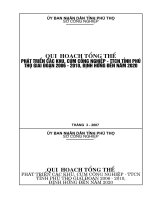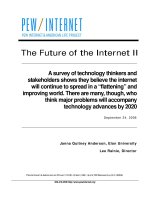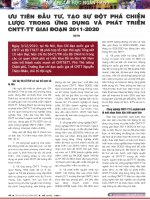2020
Bạn đang xem bản rút gọn của tài liệu. Xem và tải ngay bản đầy đủ của tài liệu tại đây (305.43 KB, 8 trang )
<span class='text_page_counter'>(1)</span><div class='page_container' data-page=1>
<b>CÁC EM LÀM NHỮNG BÀI TẬP NÀY ĐỂ SÁNG THỨ 7 THẦY GIÁO</b>
<b>CHỮA TRÊN ZOOM NHÉ</b>
<b>UNIT 9: NATURAL DIASTERS</b>
<b>Exercise 1: Name some types of natural disasters.</b>
1. ... 2. ...
3. ... 4. ...
5. ... 6. ...
7. ... 8. ...
<b>Exercise 2. Match the word/ phrase with the correct definition.</b>
<b>No</b>
<b>.</b> <b>Term</b>
<b>Opt</b>
<b>.</b> <b>Definition</b>
1. basement A. changes in the earth’s weather, including changes
in temperature, wind patterns and rainfall
2. climate
change
</div>
<span class='text_page_counter'>(2)</span><div class='page_container' data-page=2>
3. disaster C. the process of moving people from a place of
danger to a safer place
4. emergency D. a set of rules or instructions that are given by an
official organization telling you how to do
something
5. eruption E. a room or rooms in a building, partly or
completely below the level of the ground
6. evacuation F. a sudden serious and dangerous event or situation
which needs immediate action to deal with it
7. global
warming
G. the increase in temperature of the earth’s
atmosphere, that is caused by the increase of
particular gases, especially carbon dioxide
8. guideline H. having no home
9. homeless I. an occasion when a volcano suddenly throws out
burning rocks, smoke, etc.
10. temporary J. an unexpected event, such as a very bad accident,
a flood or a fire, that kills a lot of people or
causes a lot of damage
<b>Your answer:</b>
1. ... 2. ... 3. ... 4. ... 5. ...
6. ... 7. ... 8. ... 9. ... 10. ...
<b>Exercise 3: Put these sentences into the passive form.</b>
1. Mary types letters in the office.
...
2. His father will help you tomorrow.
...
3. Science and technology have completely changed human life.
...
4. Peter broke this bottle.
...
5. They are learning English in the room.
</div>
<span class='text_page_counter'>(3)</span><div class='page_container' data-page=3>
6. Nothing can change my mind
...
7. No one had told me about it.
...
8. I don’t know her telephone number.
...
9. My students will bring the children home.
...
10.They sent me a present last week.
...
<b>Exercise 4: Put these sentences into the passive form (Interrogative form).</b>
1. Do they teach English here?
...
2. Will you invite her to your wedding party?
...
3. Has Tom finished the work?
...
4. Did the teacher give some exercises?
...
5. Have they changed the window of the laboratory?
...
6. What books are people reading this year?
...
7. How did the police find the lost man?
...
8. Who took after the children for you?
...
9. How long have they waited for the doctor?
...
10.What time can the boys hand in their papers?
</div>
<span class='text_page_counter'>(4)</span><div class='page_container' data-page=4>
<b>Exercise 5: Write the sentences in passive form: Modal verbs.</b>
1. You can’t wash this dress.
...
2. You should open the wine about 3 hours before you use it.
...
3. Members may keep books for 3 weeks.
...
4. Passengers shouldn’t throw away their tickets as inspectors may check them
during the journey.
...
5. They ought to have reported the accident to the police.
...
6. Visitors must leave umbrellas and sticks in the cloakroom.
...
7. You should have taken those books back to the library.
...
8. We cannot exchange the goods which customers have bought during the
sale.
...
9. You mustn’t move this man; he’s too ill.
...
10.When they have widened this street, the roar of the traffic will keep residents
awake all night.
...
<b>Exercise 6: Choose the correct answers.</b>
1. He broke my watch.
A. My watch were broken. B. My watch be broken.
C. My watch is broken. D. My watch was broken.
2. The teacher explained the rule to the student.
</div>
<span class='text_page_counter'>(5)</span><div class='page_container' data-page=5>
C. The students were explained the rules.
D. A and B are correct
3. He often asks me to help him.
A. He is often asked to help them.
B. They are often asked to help me.
C. I am often asked to help him.
D. I am often asked him to help me.
4. His friends never forgave his betrayal.
A. His betrayal were never forgiven by his friends.
B. His betrayal was never forgiven by his friends.
C. His betrayal was never forgave by his friends.
D. His betrayal never forgave by his friends.
5. I am sure we’ll settle the matter easily.
A. I’m sure the matter will settle easily.
B. I’m sure the matter will be settled easily.
C. I’m sure the matter will settled easily.
D. I’m sure the matter won’t be settled easily.
6. They speak much about this book.
A. This book is much spoken about.
B. This book is much spoken.
C. This book is much about spoken.
D. This book are much spoken about.
7. Have they tested all the machines?
A. Have all the machines be tested?
B. Have all the machines been testing?
C. Have all the machines been tested?
D. Have all the machines been being testing?
8. Does he realize that they are laughing at him?
</div>
<span class='text_page_counter'>(6)</span><div class='page_container' data-page=6>
C. Does he realize that he is laughing at?
D. Does he realize that he is being laughed at?
9. The manager offers me several jobs.
A. I was offers several jobs.
B. I am offered several jobs.
C. Several jobs are offered to me.
D. B and C are correct.
10.We found that they had cancelled the soccer match.
A. We found that the soccer match had been cancelled.
B. The soccer match had been cancelled.
C. The soccer match was found that had been cancelled.
D. The soccer match was found to have been cancelled by us.
11.Mary is cutting a cake with a sharp knife.
A. A cake is being cut with a sharp knife by Mary.
B. A sharp knife is cutting a cake and Mary.
C. Mary and a sharp knife are cutting a cake.
D. Mary is cutting a sharp knife by a cake.
12.“Did Shakespeare write this play?”
A. Did this play be written by Shakespeare?
B. Was this play written by Shakespeare?
C. This play was written by Shakespeare.
D. Did this play Shakespeare write?
13.Which book do the students love?
A. Which book are done love by the students?
B. Which book is the students loved?
C. Which book are loved by the students?
D. Which book is loved by the students?
14.How many slums are they going to clear?
</div>
<span class='text_page_counter'>(7)</span><div class='page_container' data-page=7>
B. How many slums are being cleared?
C. How many slums are going to clear?
D. How many slums are going to be cleared?
15.Who wrote the report on the air pollution?
A. By whom was the report on the air pollution written?
B. Whom was the report written on the air pollution by?
C. By whom was the report written on the air pollution?
D. All are correct.
16.Who killed President John Kennedy?
A. By whom President John Kennedy was Killed?
B. By whom was President John Kennedy Killed?
C. By whom was killed President John Kennedy?
D. By whom killed President John Kennedy?
17.How many students are carrying the bookshelf?
A. By how many students are the bookshelf being carried?
B. By how many students is the bookshelf being carried?
C. By how many students is the bookshelf been carrying?
D. By how many students are the bookshelf be carrying?
18.People say that Mary is a good worker
A. Mary is said that she is a good worker.
B. Mary is said to be a good worker.
C. It is said to be a good worker.
D. Mary is said that to be a good worker.
19.It is believed that the man escaped in a stolen car.
A. The man is believed to escaped in a stolen car.
B. The man is believed to have escaped in a stolen car.
C. The man is believed to escaped in a stolen car.
D. They believed that the man stole the car.
</div>
<span class='text_page_counter'>(8)</span><div class='page_container' data-page=8>
B. The budding was thought to have been destroyed.
C. The building thought to be destroyed.
D. They have destroyed the building.
<b>Exercise 7: Put the verbs in brackets: Past perfect or past simple.</b>
1. They (go) ... home after they (finish) ... their work.
2. She said that she (already, see) ... Dr. Rice.
3. After taking a bath, he (go) ... to bed.
4. He told me he (not/eat) ... such kind of food before.
5. When he came to the stadium, the match (already/begin) ...
6. Yesterday, John (go) ... to the store before he (go) ... home.
7. She (win) ... the gold medal in 1986.
8. Our teacher (tell) ... us yesterday that he (visit) ...
England in 1970.
</div>
<!--links-->









